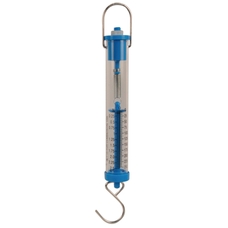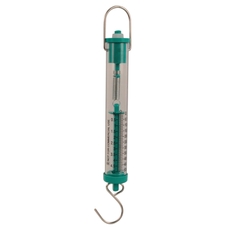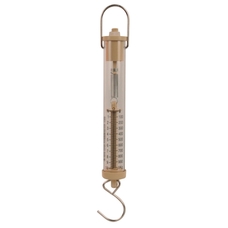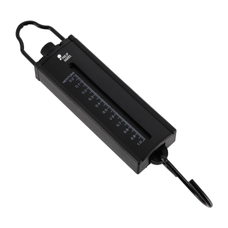Philip Harris Spring Balance (Newton Meter) - 0 to 10N x 0.1N
Philip Harris Spring Balance (Newton Meter) - 0 to 10N x 0.1N
Product code: G1008716
Product Description
Philip Harris Spring Balance, Rectangular Plastic Body (Newton Meter) - 0 to 10N x 0.1N
Tough moulded body with large, easy to read flat scales. A thumb operated knurled zero adjuster is incorporated, and large suspension rings and load hooks are also provided.
- Dimensions (including ring and hook): 205mm x 41mm x 23mm
- Range: 0 to 10N x 0.1N
- Scale length: 80mm
- Key Stage 3 Physics - Motion and Forces: Forces measured in newtons, measurements of stretch or compression as force is changed. Opposing forces and equilibrium: weight held by stretched spring or supported on a compressed surface. Forces as pushes or pulls, arising from the interaction between 2 objects. Forces associated with deforming objects; stretching and squashing – springs; with rubbing and friction between surfaces, with pushing things out of the way; resistance to motion of air and water.
- Key Stage 4 Physics - Forces and Motion: Acceleration caused by forces; Newton’s First Law. Calculating work done as force x distance; elastic and inelastic stretching. Explain that weight is an effect of gravity which can vary with the gravitational field strength g (measured in N/kg) and recognise and predict phenomena that depend on weight and non inertial mass and distinguish between the two. Relate the newton as the unit of force to the units of inertial mass and of acceleration.
Philip Harris Spring Balance, Rectangular Plastic Body (Newton Meter) - 0 to 10N x 0.1N
Tough moulded body with large, easy to read flat scales. A thumb operated knurled zero adjuster is incorporated, and large suspension rings and load hooks are also provided.
- Dimensions (including ring and hook): 205mm x 41mm x 23mm
- Range: 0 to 10N x 0.1N
- Scale length: 80mm
- Key Stage 3 Physics - Motion and Forces: Forces measured in newtons, measurements of stretch or compression as force is changed. Opposing forces and equilibrium: weight held by stretched spring or supported on a compressed surface. Forces as pushes or pulls, arising from the interaction between 2 objects. Forces associated with deforming objects; stretching and squashing – springs; with rubbing and friction between surfaces, with pushing things out of the way; resistance to motion of air and water.
- Key Stage 4 Physics - Forces and Motion: Acceleration caused by forces; Newton’s First Law. Calculating work done as force x distance; elastic and inelastic stretching. Explain that weight is an effect of gravity which can vary with the gravitational field strength g (measured in N/kg) and recognise and predict phenomena that depend on weight and non inertial mass and distinguish between the two. Relate the newton as the unit of force to the units of inertial mass and of acceleration.





